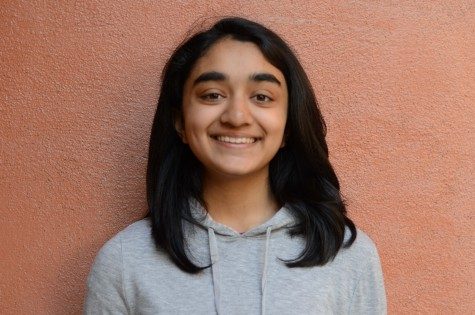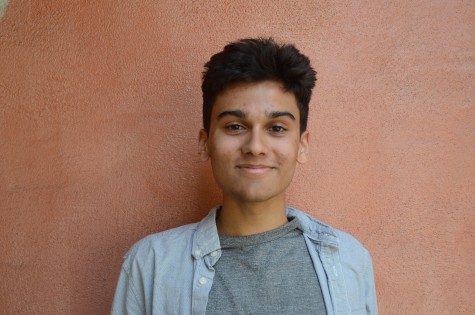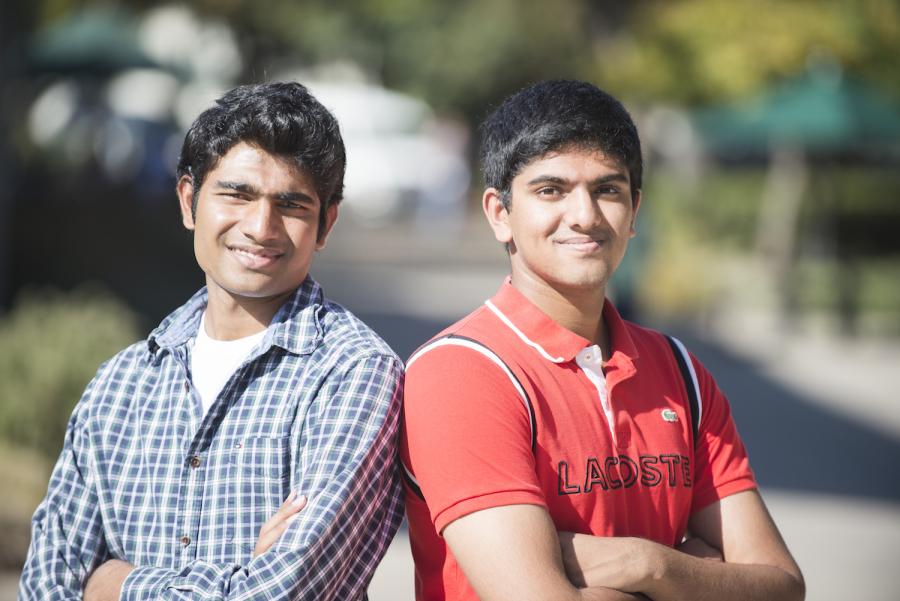Q&A with co-founders of V Squared Applications, Vamsi Gadiraju and Vedant Thyagaraj
Vedant Thyagaraj (12) and Vamsi Gadiraju (12) co-founded the startup V-Squared. The company uses sensor technology to monitor consumer preferences in retail stores.
Winged Post: What does your company do?
Vamsi Gadiraju (12): It uses something called iBeacon, which allows us to use sensors that can basically track the movement of phones and other devices that use Bluetooth technologies. […] We can figure out how to better advertise, [and two] it figures out which parts of your store you need to actually allocate more heat and energy to. We can see where people generally tend to move throughout the rooms, and we build algorithms based off that. Using that information, we are actually able to [obtain a] 25 to 30 percent decrease in energy.
Vedant Thyagaraj (12): Our goal is to really bring consumers back to the retail stores and really have them enjoy that retail experience. The way we’re trying to do that is we’re trying to use a hub of sensors. For the customer, these sensors will basically track their patterns, using Bluetooth 4.0 or above; once we track their patterns, we can more effectively target ads to the them, [and] we can more effectively send them price coupons and discounts. From the retail side, we’re basically trying to have stores owners really know which products their consumers are liking so that they can target their sales more effectively. They know the product base that they’re trying to tap into, and based on that, they can scale their marketing and retail efforts accordingly. So basically we’re trying to connect people more through the whole platform of the mobile phone […] and we’re trying to really enhance retail patterns that way.
WP: How did you get interested in sensor technology?
VG: Vedant and I are really interested in computers and just technology in general. One of the really big fads in technology and advertising right now is Big Data, where you collect as much data [as] you possibly can. What Vedant and I wanted to do is basically find a way to sort of incorporate Big Data into advertising.
WP: So how do you propose to use this in a school setting?
VG: The first element to our plan is just helping people out. We have tours to introduce people to the school, and one of the things we thought was sort of interesting is to develop an iPhone app for the school. Say you were walking by Main Hall, you can push a notification that tells you this is what Main Hall is, this is its history, these are what classes we have here, and provide a more interactive experience with the school in general. In addition, for students, we also had several interactive features; in case you want to see the lunch menu when you walk by Manzanita you can push a notification. Furthermore, we had a few other ideas for teachers. For example, instead of putting documents on Athena, once you go into the classroom the teachers can push documents [and] powerpoints directly onto your laptop.
WP: When you originally started the company, were you apprehensive about anything?
VG: Absolutely, there’s a lot of litigation, and we were really worried in the beginning that [if] there were other companies doing something [similar], we could get sued […] The other thing we were really scared [about] was funding. As you probably know, it requires a lot of money and outside support. Since we’re both high-schoolers and seniors too with college apps, we were worried [about] how much time [we] were going to put in.
WP: Is there anything you wish you’d done differently?
VT: Vamsi and I both would have started earlier on, and I think we would have tried to get the idea honed in earlier on so that we would have had more time because there’s a lot of competition going on in this field right now. Considering that we’re just a two-man team right now but we have some prospective members joining us soon, I think that just getting to the industry early… maybe one or two years ago, would have been much better, and we would have been able to really have our product implemented and scaled into many different stores by now.
WP: What projects are you working on currently?
VG: Right now we’re working on our seed funding round. We’re hoping to get anywhere from $25,000 to $30,000 of funding. We’re going out and pitching to venture capitalists [VCs].
WP: What are your plans and goals for the company?
VT: I guess Vamsi and I both believe that our immediate goal is to first of all get the prototype functional, get it working, and get it implemented and set up in different stores. So, our goal is to start with slightly smaller boutique stores that do not necessarily have such a huge consumer base just to prevent anything that could go wrong, and then from there, if everything goes well, we can adjust the product however we need to and scale to the typical Walmart or the typical Nike store. In the long term, though, I guess our goal would be to get a connected city, […] so basically wherever you are, through the power of this mobile platform, you will have access to any type of data […] at your fingertips. Really, what we’re trying to imagine is a connected world, where you’re going to have your smartphone, and your life is really going to change with the new uses we can employ this mobile platform for.
WP: Do you have any advice for other students who might be interested in starting a company?
VG: My advice is to definitely reach out to everyone you know. Throughout this process, Vedant and I have had a lot of mentors, from family friends to VC’s in the area that we’ve met through different events like debate, BEcon, DECA, and other events. Don’t be afraid to make the jump; it’s pretty scary at first to start a company wondering how you’re going to finance this, what if there any issue[s] in the future. After we got over that initial fear, we were in a great position and we have the chance to build something that we really enjoyed and really wanted to do.
This piece was originally published in the pages of the Winged Post on October 17, 2014.
Tara Parimi (12) is co-Editor-in-Chief of Harker Aquila, and this is her fourth year on staff. She has been involved with the upper school's journalism...

Sahana Srinivasan (12) is the Editor-in-Chief of the Winged Post and Wingspan, having previously served as Managing Editor, Asst. STEM Editor and a reporter....

Shay Lari-Hosain (12) is the Editor-in-Chief and co-founder of Wingspan Magazine. Shay has interviewed 2013 Nobel Laureates, authors like Khaled Hosseini...


















![“[Building nerf blasters] became this outlet of creativity for me that hasn't been matched by anything else. The process [of] making a build complete to your desire is such a painstakingly difficult process, but I've had to learn from [the skills needed from] soldering to proper painting. There's so many different options for everything, if you think about it, it exists. The best part is [that] if it doesn't exist, you can build it yourself," Ishaan Parate said.](https://harkeraquila.com/wp-content/uploads/2022/08/DSC_8149-900x604.jpg)




![“When I came into high school, I was ready to be a follower. But DECA was a game changer for me. It helped me overcome my fear of public speaking, and it's played such a major role in who I've become today. To be able to successfully lead a chapter of 150 students, an officer team and be one of the upperclassmen I once really admired is something I'm [really] proud of,” Anvitha Tummala ('21) said.](https://harkeraquila.com/wp-content/uploads/2021/07/Screen-Shot-2021-07-25-at-9.50.05-AM-900x594.png)







![“I think getting up in the morning and having a sense of purpose [is exciting]. I think without a certain amount of drive, life is kind of obsolete and mundane, and I think having that every single day is what makes each day unique and kind of makes life exciting,” Neymika Jain (12) said.](https://harkeraquila.com/wp-content/uploads/2017/06/Screen-Shot-2017-06-03-at-4.54.16-PM.png)








![“My slogan is ‘slow feet, don’t eat, and I’m hungry.’ You need to run fast to get where you are–you aren't going to get those championships if you aren't fast,” Angel Cervantes (12) said. “I want to do well in school on my tests and in track and win championships for my team. I live by that, [and] I can do that anywhere: in the classroom or on the field.”](https://harkeraquila.com/wp-content/uploads/2018/06/DSC5146-900x601.jpg)
![“[Volleyball has] taught me how to fall correctly, and another thing it taught is that you don’t have to be the best at something to be good at it. If you just hit the ball in a smart way, then it still scores points and you’re good at it. You could be a background player and still make a much bigger impact on the team than you would think,” Anya Gert (’20) said.](https://harkeraquila.com/wp-content/uploads/2020/06/AnnaGert_JinTuan_HoHPhotoEdited-600x900.jpeg)

![“I'm not nearly there yet, but [my confidence has] definitely been getting better since I was pretty shy and timid coming into Harker my freshman year. I know that there's a lot of people that are really confident in what they do, and I really admire them. Everyone's so driven and that has really pushed me to kind of try to find my own place in high school and be more confident,” Alyssa Huang (’20) said.](https://harkeraquila.com/wp-content/uploads/2020/06/AlyssaHuang_EmilyChen_HoHPhoto-900x749.jpeg)



